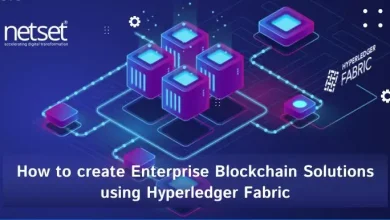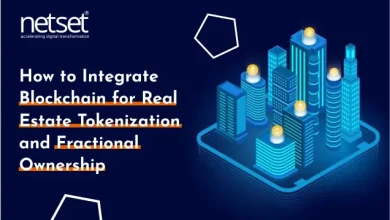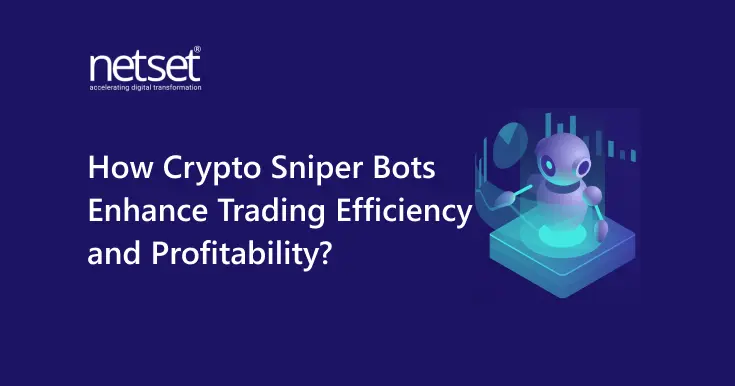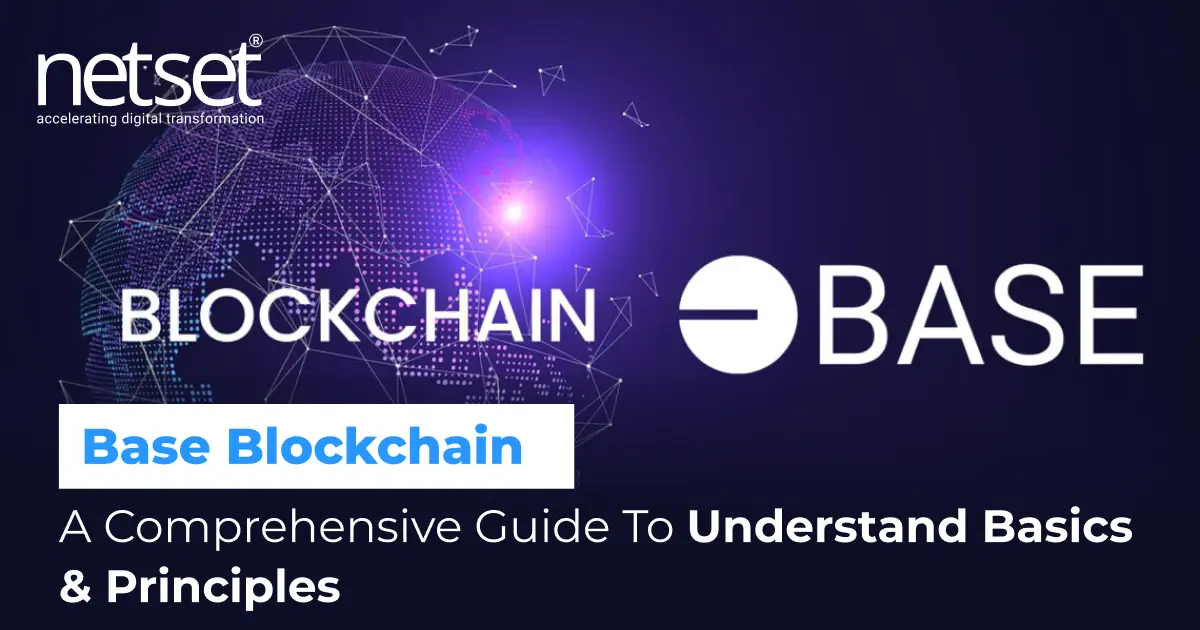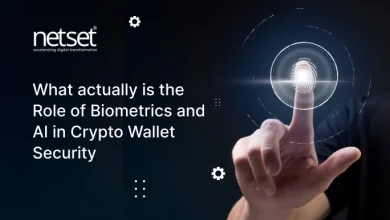What Is Modular Blockchain Architecture and Why Enterprises Are Adopting It?

Since the Bitcoin days, it is evident that blockchain has really come a long way. It was only visible as a decentralized ledger for crypto, but is now popular among enterprises for finance, supply chains, digital identity, and whatnot.
But the catch is that as the adoption increases, businesses are preferring the systems that are fast, easily scalable, and upgradable. This is where modular blockchain architecture comes into the picture as it has the potential to solve the challenges that arises in traditional solutions.
So, what does module blockchain architecture actually mean and what makes it unique when we compare to traditional models? Why are enterprises preferring it, and how do you build smarter with it? Let’s find out everything.
Shift in blockchain design- understanding modular blockchain architecture
If you have explored about the talk about earlier blockchain systems like Bitcoin or Ethereum, they were monolithic in nature. It means that all the core components in these systems, like the execution, consensus, data storage, and settlement, were tightly mixed into one block. While this was working for most of the early blockchain use cases and the adoption was increasing, it was also posing a few problems, like no flexibility, slow upgrades, and high fees.
But, the module blockchain architecture, on the other hand, broke the system into smaller and upgradable layers like
- The execution layer, which you can think of as the “engine of the blockchain,” is responsible for processing all the transactions and running smart contracts.
- The consensus layer is the “agreement maker” whose job is to make sure that all the validators (computers or people verifying transactions) agree in a certain and right order.
- The data availability layer is the “record keeper and sharer” to make sure all the data on the blockchain stays secure and available to whoever needs it.
- The settlement layer which records the status of the final transaction.
You can think of it just like we can upgrade multiple parts of the PC, like RAM, storage, and graphics, as per our requirements, without replacing the whole machine. This is the key flexibility that the module blockchain is offering to all businesses and enterprises. Also, don’t just think that this shift is a theory because Electric Capital’s 2024 Developer Report shared that 1 in 3 crypto developers are working on multi-chains, a notable increase from less than 10% in 2015.
Why do enterprises prefer module architecture?
Do not just think that adopting blockchain is just like plugging in a new tool for the businesses. It is a solid strategic shift because enterprises need systems that scale with demand, meet the regulations, and mix well with existing platforms.
The module blockchain makes all of this easier due to its working, starting with its ability to scale without any limits (execution and consensus layers). There are lower transaction costs because optimized execution layers lower the gas fees. Plus, it is easy to upgrade everything where you can enhance one module, like performance or privacy, without having any impact on the other one.
Finally, enterprises can create permissioned execution layers while using public chains like Ethereum for settlement; hence, customization is possible by use case. So, all these reasons combine to become the reason why large businesses are partnering with blockchain software development companies in USA for building module blockchain stacks.
How is the module blockchain used in different industries in the real world?
Although the number of industries can be massive, there are a few important industries where module blockchain is transforming everything.
Let’s start with banking and finance, where modular blockchains are acting as the core transaction platforms where private, high-speed execution layers settle on public, audible chains like Ethereum. Further, in the supply chain industry, firms can track goods in exact real time with a lightweight execution module collecting data and a secure consensus module that makes sure no tampering occurs. In the healthcare modular system, it keeps patients records private (with a custom execution layer) while also using shared data layers for non-sensitive medical statistics. Finally, in Gaming & NFTs, high-frequency transactions are handled off-chain (execution), while assets are settled and validated securely on the chain.
This level of flexibility is not possible with traditional blockchain designers. So, enterprises are choosing modular designs as part of their blockchain developer solution to balance transparency, performance, and compliance, which were lacking in older architectures.
Key Enterprise Benefits- What module does blockchain offer at scale?
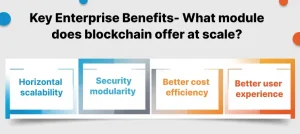 As modular architecture becomes more refined, it is delivering measurable value to enterprise systems. Some of the top benefits include
As modular architecture becomes more refined, it is delivering measurable value to enterprise systems. Some of the top benefits include
- Horizontal scalability, where you can add new chains or layers without affecting the system at all.
- Security modularity, where you can customize validator rules, privacy layers, and permissions access easily.
- Better cost efficiency, where you can scale or upgrade the layers you need as per your convenience.
- Better user experience for faster confirmation times, lower fees, and more responsive apps.
As per one of the papers on ScienceDirect, the Module blockchain system can lower the 10% decision errors in hospitalized patients and 12.6% of deaths related to medical errors. That is why companies across industries are looking to hire blockchain developer India teams who are skilled in modular stacks like Celestia, Cosmos, Polygon, and Optimism.
Planning and building a modular blockchain system
Adopting module blockchain starts with the right planning so it is important to talk about how a business or enterprise can go about it.
The major step is defining the business logic; for example, what will your execution layer do? Smart contracts? Asset tracking? Identity? Once this is done, you can move to pick the right stack by mixing and matching the technologies like Celestia (data layer), Polygon CDK (execution), or Ethereum (settlement). Then make sure to design for flexibility where each layer can evolve independently without major rewrites. Finally, move to the secure integration step so that different modules communicate securely and reliably.
For a successful solution implementation, partner with a reliable modular blockchain development services provider who can promise having dedicated experience with blockchain technology.
How can NetSet Software help enterprises with modular blockchain solutions?
Just when blockchain technology was introduced, we have been a pioneer in empowering businesses to create scalable, secure, and future-ready blockchain apps and solutions, and now with modular architecture. Our work is recognized by leading media partners quoting us as a reliable blockchain software development company that will create solutions that exactly meet your business’s needs. Whether you go with Cosmos or Polkadot or any other module chains, we have the resources that your product deserves.
The road ahead
Do not think that module blockchain is just a trend and will go down as new innovations come. Instead of just a trend, it has become a natural evolution for the modern blockchain technology.
When businesses move from idea to real product development, they need systems that are upgradable without downtime, can grow as the user base increases, and offer the best privacy, interoperability, and performance.
For now, and in the coming future, modular blockchain is growing as a new standard when it comes to blockchain development solutions.
FAQs
What does modular blockchain architecture mean?
It simply aims to break the blockchain into layers like execution, data, and consensus rather than having everything in the one block, giving you the best flexibility to customize as per your needs.
Is modular blockchain better than monolithic?
Very evidently, yes! It has better flexibility and scalability and allows you to update your blockchain faster as compared to monolithic methods.
Can modular blockchain work for every industry?
Without any second thought, modular blockchain can transform banking and logistics to healthcare and supply chain, fitting every use case.
Is it tough to build a modular blockchain system?
It is tough, but when you partner with the right blockchain app development company, the whole process is simplified due to their extensive experience.
Where can I find teams to create modular blockchain apps?
If you don’t want to compromise on the quality, yet want to have a budget-friendly option, then you must hire a blockchain developer in India instead of going with some other region.
